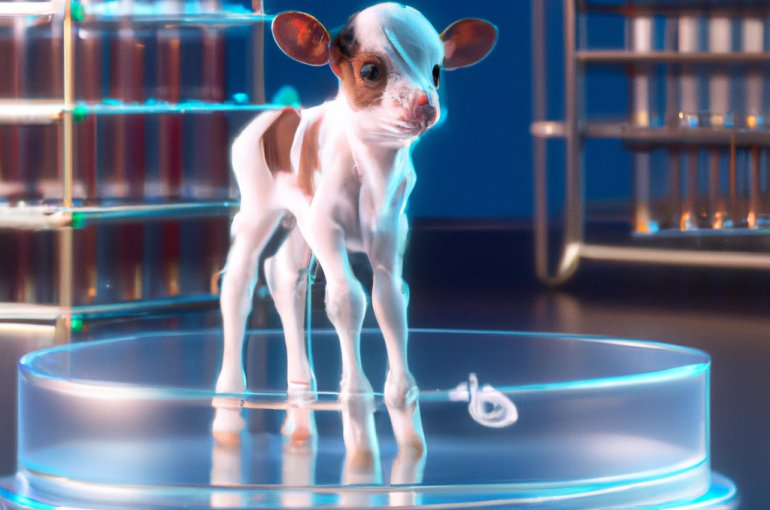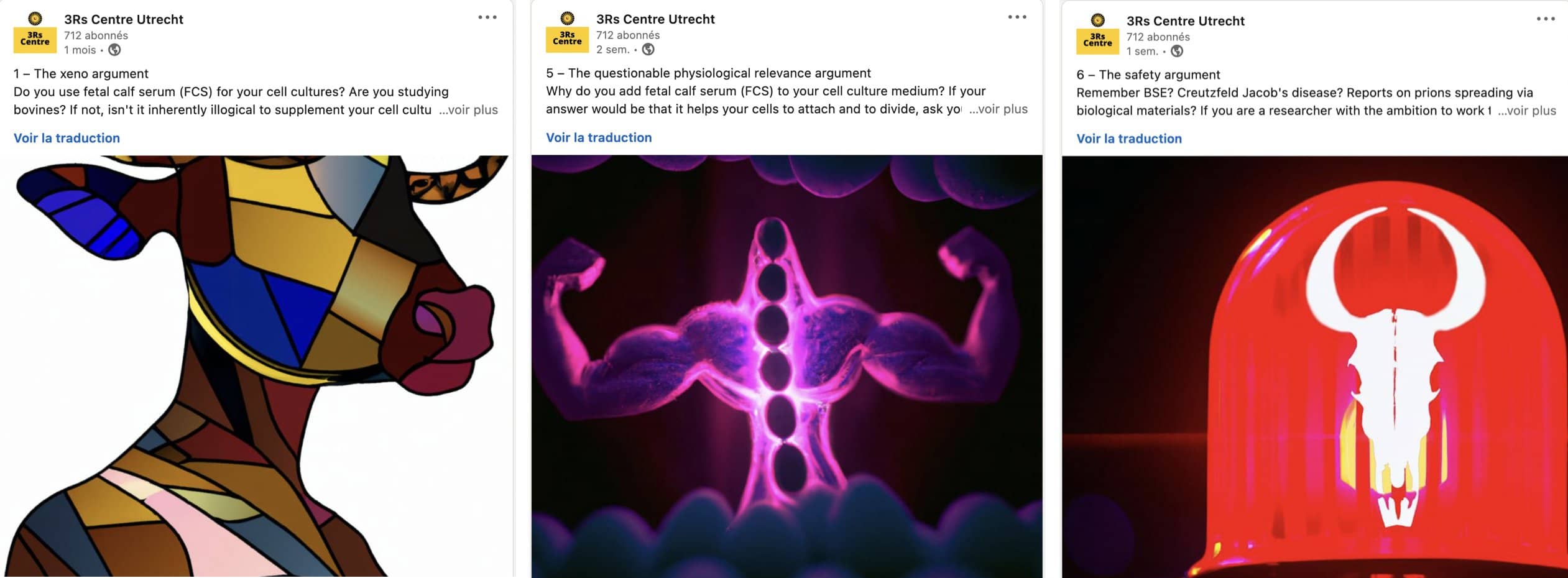

The FC3R recently selected for funding innovative research projects aiming at replacing the use of animals in research, but also animal-derived products such as FCS, matrigel, collagen, etc : discover these projects.
Numerous animal-derived products continue to be utilized in research, even in so-called "alternative" non-animal methods, such as in vitro cell cultures and organoids. Fetal Calf Serum (FCS) is the most prevalent, with an annual worldwide production of approximately 600,000 to 800,000 liters, sourced from around 1 to 2 million bovine fetuses (Festen, 2007). As a by-product of the meat and dairy industry, FCS is obtained when a cow's pregnancy is discovered at the slaughterhouse, at which point the blood serum is drained via heart puncture from the living unborn calf. This blood collection process can cause suffering for the unborn calf, particularly if performed during the final third of fetal development (Jochems et al., 2002), which still happens in France, despite expert recommendations that lead other European countries to ban this practice. Although measures can theoretically be taken to minimize suffering (van der Valk et al., 2004), FCS collection lacks regulation by authorities (as recently confirmed by the European Parliament), making it impossible to determine which precautions are genuinely implemented and to what extent.
3Rs Centre Utrecht’s campaign
Besides the major ethical concerns raised by the production of FCS, there are good scientific arguments to change cell culture habits. The 3Rs Centre Utrecht launched from February 14th to March 29th a 2-months campaign on social media, aimed at researchers who work with FCS. “With this campaign, we hope to call into question a few of the assumptions we have around the use of FCS”, says Jeffrey Bajramovic, the Netherland centre’s director. Among their other missions, 3R centers aim to promote Replacement and support the development of “alternative”, “non-animal” or “new approach” methods (NAMs). “Many NAMs are based on cell culture methods which have in common that animal-derived products, such as FCS, are often used in their protocols”, says Bajramovic. “However, the use of FCS is accompanied by major ethical and scientific concerns.” The Netherland’s 3R center have been specifically addressing some of these scientific concerns in weekly posts on social media, in order to stimulate discussion among researchers, and initiate a change in their working habits. Zoom on these arguments.

Concerns for the use of FCS
-
Ethical: Although we aim to reduce or stop the use of animals for research purposes by using NAMs, the use of FCS in cell culture protocols still requires that we inflict stress and suffering to animals (cow abortion, death of the mother, blood-draining of the fetus etc) to obtain substances that can already be replaced for several research applications.
-
Cost: FCS is still cheaper than the currently available alternatives, but its cost is expected to increase with the prices of cattle-derived products while the costs of alternative products are decreasing. Also, when considering costs, it is important to realize the impact of results quality and translatability for research, medicine, public health and society.
-
Questionable physiological relevance: The addition of FCS may alter cells phenotype and behavior in a non-physiological way : de-differentiating, proliferating and developing strong attachement/adherence like tumor cells look-a-likes. Its use might negatively affect the results relevance for human physiology, especially when studying cells that are supposably non-proliferating.
-
Sustainability: Less than a liter of serum is obtained from one fetal calf. The annual use of any research center easily reaches hundreds of liters of FCS. This negatively impacts carbon emissions as well as society’s sustainability goals. Also, we cannot continue to produce this quantity of serum indefinitely considering the number of calves needed.
-
Xenogenic origin of FCS: It is inherently illogical to supplement a cell culture medium with a product derived from another species. This negatively affects the results validity, as they may be confounded by reactions to the exposure of biological material from another species.
-
Unknown composition & batch-to-batch variability: For researchers, control is key to reproducibility. However, the exact composition of FCS is unknown, making it impossible to know which or how many factors are affecting the cells in culture, and it is produced and sold in batches, always different because produced from different calves. This negatively affects the results reproducibility, validity, reproducibility and translatability. Why choose to include an unknown and uncontrolled source of variability in any experimental setup?
-
Safety: The use of FCS is incompatible with current safety regulations. Such regulations are taken to prevent possible contamination of animal-derived pathogens (such as e.g., prions or other zoonotic pathogens). Even if clinical application is far downstream, this negatively affects the applicability of your results.
-
Innovation: Progress sometimes requires adaptation. Even though, at first glance, it might appear to be a complex and challenging task, implementing these measures will increase the validity of scientific discoveries, improve basic research and drug development, and eventually lead to better outcomes for scientific progress and for public health.
Alternatives to FCS in research
Many good alternatives for FCS have become available over the last years, and they are worthwhile testing for every research application (Weber et al., 2022, Rafnsdóttir et al., 2023). They are of two types:
-
Human Platelet Lysate (hPL): of human origin, ethically obtained, strictly controlled, xeno-free, universally usable, and more efficient for growing human cells, hPL has been successfully introduced with a view to replacing FCS, especially for the expansion of human cells for clinical use in cell therapy or tissue engineering. However, it is rare and precious, and - like FCS, it is undefined and may present batch-to-batch variability.
-
Chemically-defined media (CDM): they are synthetic alternatives, free of contaminations, xeno-free, well-defined, and customizable to suit most cell types and cell lines. For example, a French company, BIORCELL 3D - a spin-off of Clermont Auvergne University -, has developed OPTIPASS®, a synthetic and chemically-defined culture media suitable several application in cell culture. Numerous other CDM – commercially available or lab-made - are available for different types of research applications :
